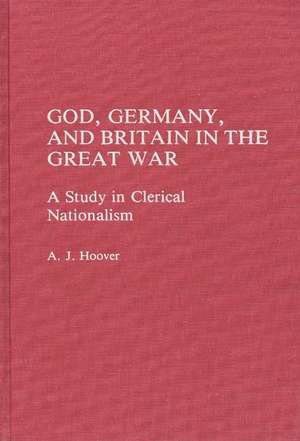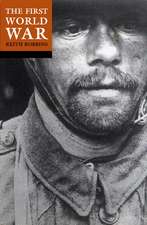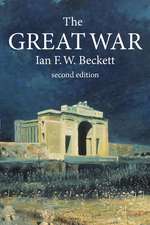God, Germany, and Britain in the Great War: A Study in Clerical Nationalism
Autor A. J. Hooveren Limba Engleză Hardback – 14 mai 1989
"God, Germany, and Britain in the Great War" compares the patriotic preaching of two major combatants in World War II--Germany and Great Britain. The core material for the study is the war sermons of the British and German clergy of 1914-1918, but the author also employs numerous speeches, books, addresses, pamphlets, and journal articles to support his arguments. As Hoover demonstrates, the Protestant churchmen played a significant role in the First World War as religion became a key ingredient in the war fever experienced on both sides. Religious historians as well as historians of World War I will find Hoover's study both enlightening and provocative reading.
Hoover explores the attacks made by each nation's clergy on the enemy and analyzes the public's responses to these attacks. Based on his close readings of the sermons, Hoover shows that ministers from each nation repeatedly stressed the national flaws of the opponent, predicting that these flaws would have to be eradicated before peace could be restored. Both found religious justification for their participation in the war, Hoover notes, in the belief that the other nation had sinned in special ways. Each defended the just war theory, carrying the justification of the ancient thesis to new and, argues Hoover, possibly invalid heights. In his final chapter, Hoover offers a measured critique of Christian nationalism summarizing its dangers and identifying implications for the future.
Preț: 460.16 lei
Preț vechi: 607.85 lei
-24% Nou
88.05€ • 92.18$ • 72.86£
Carte tipărită la comandă
Livrare economică 07-21 aprilie
Specificații
ISBN-10: 0275931692
Pagini: 163
Dimensiuni: 156 x 234 x 11 mm
Greutate: 0.42 kg
Editura: Praeger Publishers
Colecția Praeger
Descriere
Hoover explores the attacks made by each nation's clergy on the enemy and analyzes the public's responses to these attacks. Based on his close readings of the sermons, Hoover shows that ministers from each nation repeatedly stressed the national flaws of the opponent, predicting that these flaws would have to be eradicated before peace could be restored. Both found religious justification for their participation in the war, Hoover notes, in the belief that the other nation had sinned in special ways. Each defended the just war theory, carrying the justification of the ancient thesis to new and, argues Hoover, possibly invalid heights. In his final chapter, Hoover offers a measured critique of Christian nationalism summarizing its dangers and identifying implications for the future.








